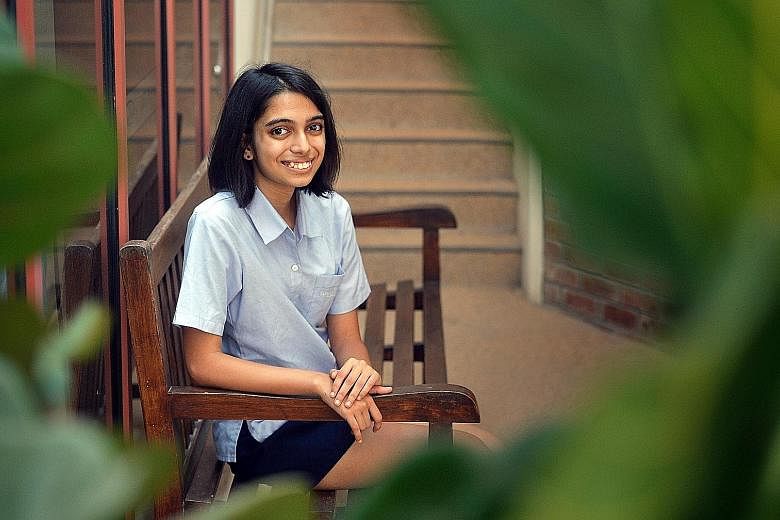For Gauri Kumar, speaking to her grandparents, who live in India, every year is like performing an intricate circus act.
The 13-year-old juggles her English and limited Hindi vocabulary to converse with her grandparents, uncles and cousins. Her balancing act includes dodging queries that come her way in Hindi, and sending back replies in English instead.
When Gauri is surrounded by relatives, she feels like the exotic on display. Language has always been a barrier that has loomed over their conversations.
A few years ago, young Gauri found herself putting her musings down on paper and hiding them in her room. She wrote about her real-life experiences and some fiction, but kept them for her eyes only. Now, her literature is in the spotlight after the Tanglin Trust School student won a prestigious essay competition.
Gauri won the junior category of The Queen's Commonwealth Essay Competition 2016, the oldest writing competition for international schools. Tan Wan Gee, 14, of Temasek Junior College was the runner-up.
The duo will fly to London next month to receive their certificates from the Duchess of Cornwall at a ceremony at Buckingham Palace. They will also take part in a series of educational and cultural events.
Said Gauri's mother, Madam Niti Gupta: "I was very happy when I found out she won. She does not usually share her writing much and I am happy that she found a platform to write from."
Gauri had submitted the essay through Singapore Chinese Girls' School earlier in the year, before she transferred to Tanglin Trust School last month.
Her love for language started early on. By three, she had begun to read the words around her. "I would sit in the car, look out and read all the road signs, annoying everyone," she said.
When she was six, Gauri read the entire Harry Potter series. "That really set me for life and I have not stopped reading since then."
When she is not reading, Gauri strums the guitar to her favourite pop tunes, often performing for her parents and sister at home. Fall Out Boy's Centuries is a song that is almost always heard in her house.
Though Gauri is an avid fiction writer, it was her personal story that gripped the judges. Her account is one that many in Singapore can relate to.
Gauri wrote about how speaking English day to day had displaced her from the language and culture of her ancestral home in India. Daughter to a commodities trader father who travels for work, Gauri's birthplace is India but it is also a land from which she feels detached.
"I should feel more comfortable going to India since it is my home and it's my ancestral home," she said. "However I don't feel that way because I have never really lived there and I don't speak the language."
Gauri has lived in Jakarta, London and Singapore. Having spent most of her life abroad, English has been the constant tongue spoken under the changing rooftops.
"At home I speak English, but my parents occasionally say something in Hindi which I will reply to in English," said Gauri, who has basic conversational understanding of Hindi.
Over time, the yearly visits back to India reignited the cultural gaps that Gauri had put on the back burner.
"During family conversations in India, we would often talk about the fact that my sister and I never spoke Hindi but my parents and relatives did," said the eldest of two daughters. "It would single us out a bit."
While Gauri and her sister understood the Hindi movies that played on TV, they would often miss out on jokes and references to pop culture because of the language gap.
To turn the tide against her communication barrier, Gauri decided to write about it, in the language she knows best.

